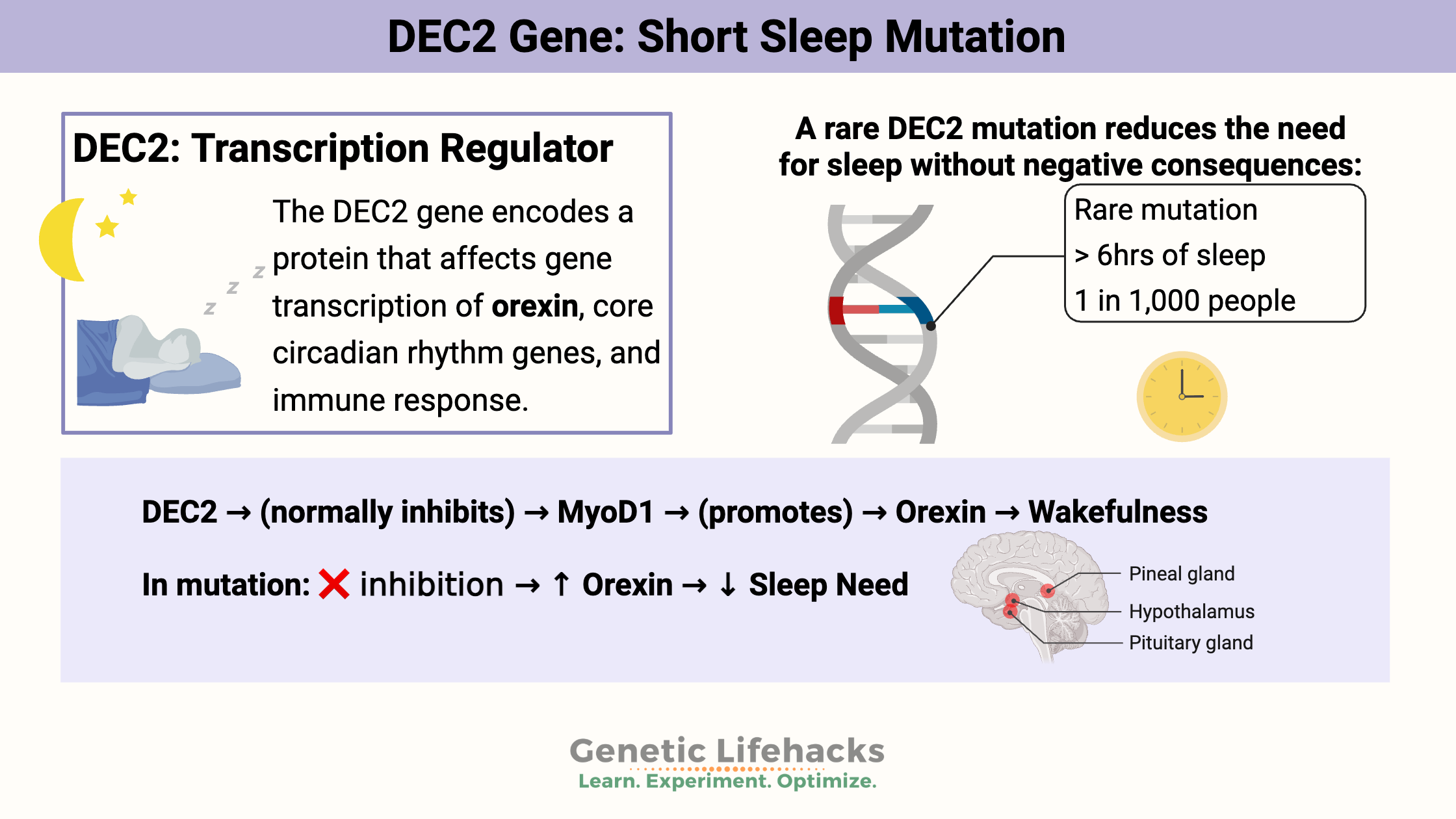Key takeaways:
~ A rare DEC2 gene mutation allows some people to thrive on ~6 hours of sleep with no negative health effects.
~ The mutation affects orexin regulation, a hormone tied to wakefulness, by disrupting DEC2’s ability to suppress its production.
~ Only about 1 in 1,000 people have this DEC2 mutation.
~ DEC2 also influences circadian rhythm and immune function, and it may play a role in cancer suppression and gum disease.
Sleep duration and the DEC2 / BHLHE41 gene mutation
I always find the outliers interesting: The people with genetic variants that cause a deviation from the norm, such as centenarians with longevity variants. For optimal health, most people require approximately 8 hours of sleep. But there are outliers who thrive with less sleep.
While most of us do best with around 8 hours of sleep, a genetic mutation in the DEC2 gene causes some people to be perfectly fine with about 1.5 hours less sleep each night.
This means that people with the mutation average 6 hours of sleep. And the kicker is that there are no known negative effects from this!
Just imagine… over the course of a year, that would be almost 550 hours not spent sleeping. You could take up a new hobby, read dozens more books, learn a foreign language, or just have more fun.
There is speculation that Trump, known for thriving with short sleep, has this gene mutation.[ref]
What does the DEC2 gene do?
Another name for DEC2 is BHLHE41 (the official gene name).[ref]
The DEC2 gene encodes a protein that affects gene transcription of genes related to sleep, circadian rhythm, and immune response.[ref][ref]
DEC2 and Orexin:
DEC2 (BHLHE41) affects orexin levels, which directly causes wakefulness. Orexins are neuropeptide hormones that bind to receptors in the hypothalamus region of the brain to cause wakefulness. It is also involved in mood, appetite, and reward. Problems in the orexin system are the cause of narcolepsy and anorexia.[ref][ref]
DEC2 is a transcriptional repressor for orexin, which means that it blocks DNA at specific spots on the gene from being transcribed and turned into a protein.
Specifically, DEC2 levels increase in the evening hours and bind to MyoD1, which is a gene that turns on orexin production. Levels of DEC2 decrease by morning, allowing MyoD1 levels to rise and thus increase orexin production.
The ‘short sleep’ mutation in DEC2 interferes with its ability to bind to MyoD1, thus allowing orexin levels to stay higher in the evenings, which results in being awake longer.[ref]
Circadian rhythm:
Your circadian rhythm is the built-in 24-hour clock that controls the function of lots of things in your body. In addition to impacting your need for sleep at night, the core circadian clock controls when your immune system is most active, how hormones are released over the course of a day, and your body temperature. In fact, your circadian rhythm controls the expression of about 40% of genes in the body.

DEC2 also suppresses the transcription of CLOCK and BMAL1, which are two proteins that are part of the core circadian clock that controls circadian rhythm. However, DEC2 isn’t the only control on circadian rhythm gene expression – instead, it plays a more minor role in healthy cells.[ref]
Immune response and cancer:
Current research shows that BHLHE41 (DEC2) is important in immune response and cancer prevention, through its role as a gene transcription regulator. Cell studies show that increased DEC2 can inhibit cancer cell proliferation, and a decrease in DEC2 is associated with more cancer growth in certain cancer types. It isn’t completely straightforward that more DEC2 is good – it depends on the type of cancer.[ref]
DEC2 may also play a role in periodontal health through regulating immune response in gum disease. A recent study using mice with low DEC2 levels showed that the animals had higher levels of proinflammatory cytokines and autophagy. [ref]
How rare is the DEC2 mutation?
The DEC2 mutation is found in around 0.1% of the population, which means about 1 in 1,000 people don’t need to sleep as much as normal. [ref]
Are there other genetic mutations that cause short sleep?
Several other genetic mutations for shorter sleep times as scientists dig into the question of what causes us to sleep:
- Another even rarer DEC2 mutation has been found by researchers. It is known as Tyr362His and does not have an rs id number yet.[ref]
- Researchers also recently found a rare mutation in the ARDB1 gene that also seems to cause naturally shorter sleep.[ref] This rare mutation does not seem to be covered in 23andMe or AncestryDNA data.
- In May 2025, a new paper was published showing that a mutation in the SIK3 gene also decreases sleep time. Interestingly, other mutations in the gene cause mice to be unusually sleepy.[ref]
The key takeaway here is that mutations that cause short sleep are rare, but they do exist.
DEC2 Short Sleep Genotype Report
Access this content:
An active subscription is required to access this content.
Related Articles and Topics:
References:
Debbie Moon is a biologist, engineer, author, and the founder of Genetic Lifehacks where she has helped thousands of members understand how to apply genetics to their diet, lifestyle, and health decisions. With more than 10 years of experience translating complex genetic research into practical health strategies, Debbie holds a BS in engineering from Colorado School of Mines and an MSc in biological sciences from Clemson University. She combines an engineering mindset with a biological systems approach to explain how genetic differences impact your optimal health.

